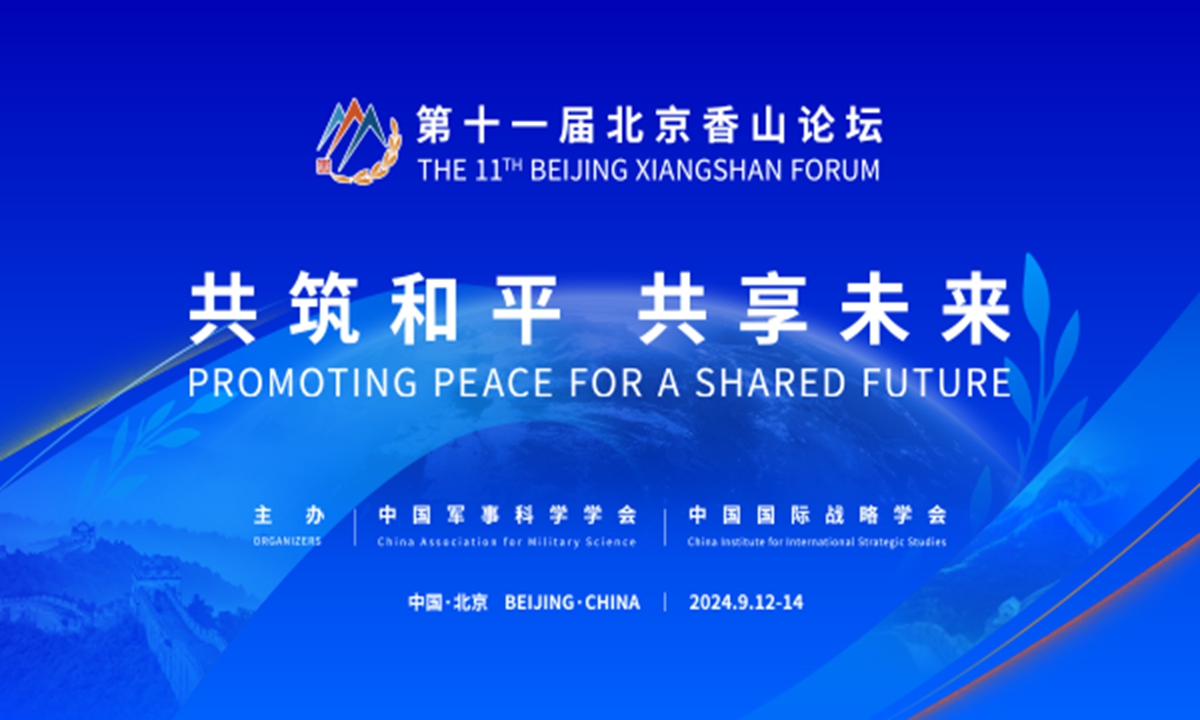
Photo: Beijing Xiangshan Forum official website
The 11th Beijing Xiangshan Forum kicks off on Thursday. The number and level of participants has exceeded all previous years, with over 500 official representatives from more than 100 countries and international organizations, as well as over 200 experts and scholars from both China and abroad. The forum comes at a time when China and the US are enhancing military exchanges, with foreign media outlets reporting that the US will send higher-ranking officials compared to last year. Despite the severe challenges currently facing global peace and prosperity, building trust and resolving doubts through dialogue and communication remain the overarching focus of the Beijing Xiangshan Forum.
The theme of this year's forum is "Promoting Peace for a Shared Future," with four plenary sessions that include topics such as "Security cooperation and Asia-Pacific Prosperity and Stability." There will also be eight simultaneous special sessions covering issues such as "ASEAN and Security Architecture of Asia-Pacific" and "Maintaining Northeast Asian Security."
In addition to addressing current pressing global security challenges, the forum will also practice the vision of common, comprehensive, cooperative, and sustainable security. This reflects a pursuit of the "greatest common denominator" for global security concerns and aims to provide a Chinese solution for global security governance.
In the past, internationally influential security forums were predominantly dominated by Western countries, leaving the voices and concerns of developing and smaller countries easily overshadowed and ignored.
In contrast, the Beijing Xiangshan Forum has always emphasized providing a platform for these nations to engage in equal dialogue and express their collective voices. Two main topics at this year's forum were "Multipolarity and the Evolving International Order" and "'Global South' and World Peaceful Development," offering more opportunities for the "Global South" to be heard. This aligns with the contemporary demand for replacing unilateralism with multilateralism and transcending zero-sum games through win-win cooperation.
This year's forum has further increased the participation of representatives from developed countries and emerging powers, with European and American scholars comprising about one-third of the foreign participants. This truly reflects China's advocacy for a more just and equitable international order, dedicated to creating more opportunities to strengthen South-South cooperation, promote North-South collaboration, and advance progress for all of humanity, demonstrating valuable inclusiveness. From guiding principles to topic selection, the Beijing Xiangshan Forum's approach to global security concerns is proactive and constructive, contributing positive energy to global security.
Currently, there is a general consensus in international community that "humanity once again stands at the crossroads of history." However, differing views exist regarding some specific issues surrounding this fundamental judgment. For instance, when it comes to maintaining global and regional security, should we employ collective deterrence or resort to dialogue and consultation? Should we prioritize "one country" or "a camp," or focus on the reasonable security concerns of all countries? These questions reflect varying perspectives on security. Countries generally share a common need to avoid confrontation through dialogue, but this dialogue must be equal, allowing nations of all sizes, wealth, and strength the opportunity to participate and express their concerns. This is also an important goal that the Beijing Xiangshan Forum is dedicated to achieving.
How military interactions between China and the US will unfold at this forum is also one of the most closely watched topics by the international community. This year, the two militaries have held multiple meetings. On September 10, Wu Yanan, Commander of the Southern Theater Command of the People's Liberation Army, held a video call with Samuel Paparo, Commander of the US Indo-Pacific Command. This marked the first video call between the theater commanders of the two countries and signified the restoration of all four military exchange and cooperation mechanisms agreed upon during the meeting between the two heads of state in San Francisco last November.
Finding the correct way for China and the US to get along with each other through dialogue is not only a matter of considering the fundamental interests of both countries and welfare of their peoples, but also a response to the world's expectations.
Safety is the prerequisite for development, and humanity is an inseparable community of security. This year marks the 70th anniversary of the Five Principles of Peaceful Coexistence. China has always been a steadfast advocate for peace and development, and a major contributor to regional and global prosperity. Therefore, we look forward to exploring a new path to security with countries around the world, one that features dialogue over confrontation, partnership over alliance, and win-win results over zero-sum game, under the guidance of the vision of common, comprehensive, cooperative and sustainable security. This is a challenge that all of humanity should respond to together, and it is also a key reason why the Beijing Xiangshan Forum has gained increasing influence and is becoming an important international public security platform.




